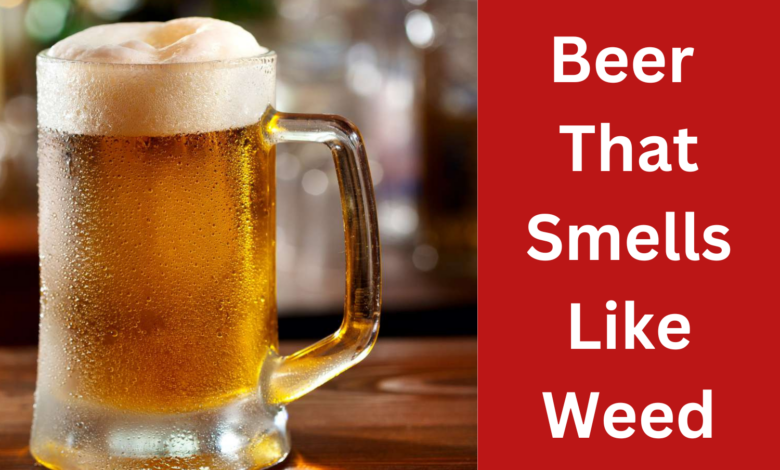Beer That Smells Like Weed , Is It Legal or Not in 2023

Introduction
Beer has long been a popular alcoholic beverage enjoyed by millions around the world. Over the years, craft breweries have introduced innovative flavors and ingredients to elevate the beer-drinking experience. One such trend that has emerged recently is the infusion of cannabis-like aromas into beer, creating a unique and intriguing combination. In this article, we will explore the world of beer that smells like weed, uncovering the brewing process, consumer reception, and the future of this captivating beverage.
The Rise of Craft Beer
Craft beer has witnessed a significant surge in popularity in recent times. Beer enthusiasts are seeking distinct flavors and quality craftsmanship, driving the growth of small, independent breweries. These breweries experiment with various ingredients to create memorable beer experiences. The desire for novelty and exploration has led to the exploration of unconventional aromas and flavors, including those reminiscent of cannabis.
Aromatic Beers: A Sensory Experience
Beer is not only about taste; it is also a sensory experience that involves aroma and visual appeal. Aromatic beers add another layer of complexity to the drinking experience. These beers often contain carefully selected ingredients that provide unique scents, enhancing the overall enjoyment. Just like the world of wine, beer connoisseurs are now looking for beers that offer intriguing and unexpected aromas.
The Emergence of Weed-Infused Beers
With the growing acceptance and legalization of cannabis in several regions, brewers have started experimenting with infusing beer with cannabis-like aromas. These beers do not contain THC or CBD, the active compounds found in marijuana, but aim to replicate the aromatic profile of cannabis strains. By utilizing specific hops and other ingredients, brewers can create beers that evoke the familiar scent of weed.
Understanding the Brewing Process
To create beer that smells like weed, brewers must carefully select and combine specific hops during the brewing process. Hops contribute to the aroma and bitterness of beer, and certain hop varieties possess terpenes that resemble those found in cannabis. Brewers leverage this similarity to mimic the distinct smell of different cannabis strains.
Popular Strains for Beer Infusion
Craft brewers experiment with various hops to create unique combinations that mimic the aroma of popular cannabis strains. Some popular strains used for beer infusion include Citra, Simcoe, Mosaic, and Amarillo. These hops are known for their tropical, citrusy, and resinous characteristics, which mirror the aromas associated with specific cannabis strains.
The Aroma and Flavor Profile
Beer that smells like weed can offer a range of aromatic profiles, depending on the chosen hops and brewing techniques. Some beers may exhibit strong pine or skunky notes, reminiscent of certain cannabis strains, while others may have more subtle floral or fruity undertones. The flavor profile can vary as well, with some beers embracing the bitterness associated with hops, while others balance it with sweet maltiness.
Legal Considerations and Regulation
The production and sale of weed-infused beers are subject to legal considerations and regulations, as cannabis laws differ from one jurisdiction to another. Brewers must adhere to strict guidelines and ensure compliance with local laws. It is essential to separate the aroma and flavor aspect of cannabis from the psychoactive properties, as weed-infused beers do not contain THC or CBD.
Consumer Reception and Market Demand
The introduction of beer that smells like weed has garnered attention from both beer enthusiasts and cannabis aficionados. The unique combination appeals to those seeking novel experiences and flavors. Craft breweries that have successfully created weed-infused beers have witnessed enthusiastic responses from consumers. The market demand for these unique brews is growing, showcasing the increasing acceptance and curiosity surrounding this unconventional beer style.
Pairing Weed-Infused Beers with Food
Just like traditional beers, weed-infused beers can be paired with various food items to enhance the dining experience. The complex aromas and flavors of these beers can complement different dishes, adding depth and intrigue to the meal. For example, beers with tropical or fruity aromas may pair well with seafood, while those with piney notes can enhance the flavors of grilled meats.
The Future of Weed-Infused Beers
As the craft beer industry continues to evolve, it is likely that weed-infused beers will become more prevalent. Breweries will further refine their techniques to create even more authentic cannabis-like aromas, expanding the range of choices available to consumers. Additionally, collaborations between breweries and cannabis companies may pave the way for truly infused beers, incorporating cannabinoids while complying with legal requirements.
Frequently Asked Questions
1. Are weed-infused beers legal?
Yes, weed-infused beers are legal in certain regions, as long as they do not contain THC or CBD.
2. Can I get high from drinking weed-infused beers?
No, weed-infused beers do not contain THC or CBD, so they do not have psychoactive effects.
3. How do brewers mimic the smell of weed in beer?
Brewers carefully select hops with terpenes that resemble the aromas of specific cannabis strains.
4. Are weed-infused beers only for cannabis enthusiasts?
No, weed-infused beers appeal to both beer enthusiasts and cannabis aficionados, offering a unique and intriguing flavor experience.
5. Can weed-infused beers be paired with food?
Yes, weed-infused beers can be paired with a variety of foods to enhance the dining experience, much like traditional beers.
Conclusion
Beer that smells like weed represents a fascinating convergence of the craft beer and cannabis industries. It offers beer enthusiasts a chance to explore new and captivating flavors while embracing the aromas associated with cannabis. As the market demand continues to rise, brewers will continue to innovate, pushing the boundaries of beer brewing and offering consumers an exciting and aromatic journey.





13 Comments